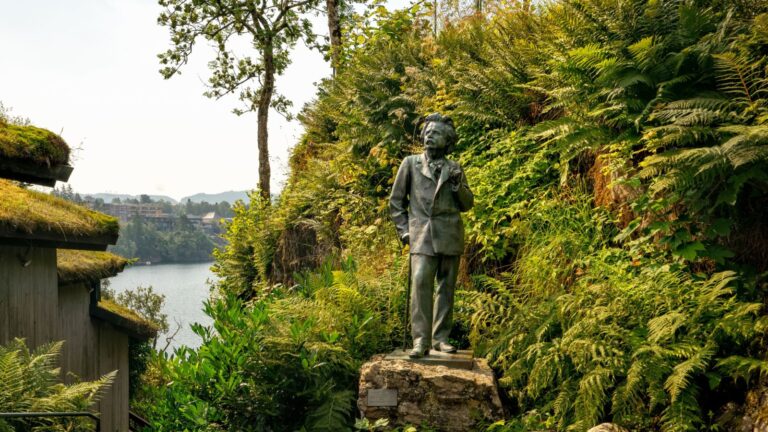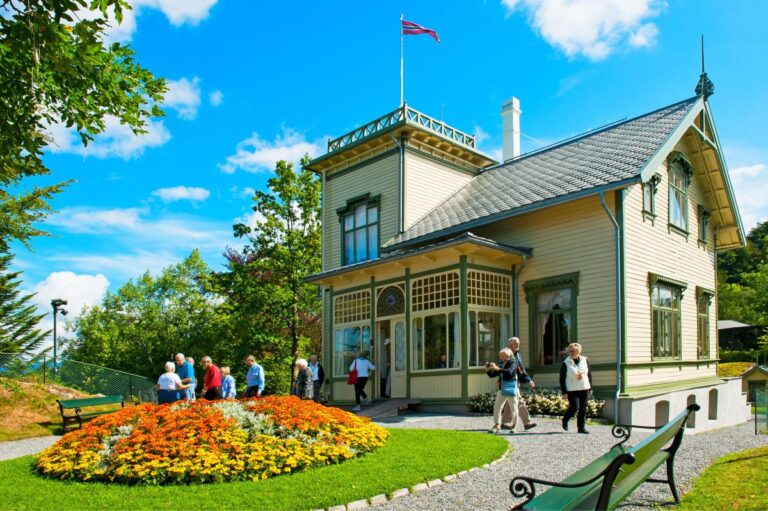Bergen's rich musical heritage is perfectly captured by its adoration for native composer Edvard Grieg. His legacy thrives through landmarks, institutions, and an enduring cultural imprint on the city.
The name Edvard Grieg often evokes a sense of nostalgia, even among those who might not regularly tune into classical melodies.

The Norwegian composer, with his profound contributions to the classical realm, has crafted pieces that have touched souls across generations and geographical boundaries.
A strong connection to Bergen
While Grieg’s contributions are universally acknowledged and celebrated, the adulation he receives in his hometown of Bergen is unparalleled. This coastal city, rich in history and culture, has an indomitable bond with the composer.
This connection is epitomized by the Bergen Philharmonic Orchestra, an institution that dates back to 1765. The esteemed orchestra once had the privilege of being led by Grieg in the capacity of Artistic Director, thereby intertwining its legacy with that of the maestro.
Who was Edvard Grieg?
Edvard Grieg (1843-1907) stands as Norway's most celebrated composer, renowned for bridging nationalistic themes with classical structures. Born in Bergen, Grieg's music often drew inspiration from the country's landscapes and folklore.
Grieg's style combined Romantic-era harmonies with Norwegian folk motifs, creating a distinct sound that resonated globally.
Born in 1843 in Bergen, his academic journey might have been fraught with challenges, but his intrinsic passion for music remained undeterred.

Opting for a path less trodden, Grieg pursued his musical inclinations, diving deep into the works of legendary composers like Mozart and Beethoven during his time in Leipzig. His sojourn in Copenhagen marked his ascent in the artsy echelons.
Love found Grieg in the form of his first cousin, Nina Hagerup, whom he wed. Their shared abode in Troldhaugen became the crucible for Grieg's most iconic collaborations, notably with Bjørnstjerne Bjørnson and Henrik Ibsen.
Peer Gynt, resulting from his partnership with Ibsen, stands out as a composition that transcends time and continues to resonate even after 150 years of its creation.
The collaboration gave birth to timeless pieces such as the uplifting Morning Mood and In the Hall of the Mountain King. These compositions, with their stirring melodies and evocative narratives, have cemented their place among globally adored classical masterpieces.
Tragically, Grieg's relentless dedication to his craft, which had brought him immense success, also sowed the seeds of his untimely demise. Chronic exhaustion claimed this prodigious talent in 1907 when he was just 64.
Bergen through the lens of Grieg
Bergen, with its picturesque landscapes and rich cultural heritage, offers a plethora of experiences for the discerning traveller.

For enthusiasts of Grieg and classical music, it promises a journey like no other. So many of the best things to do in Bergen are tinged with musical history in general, and Grieg in particular.
Troldhaugen and other famous homes
Grieg's abode in Troldhaugen stands as a beacon for music aficionados, drawing visitors from all corners of the world.
This quaint country residence just outside central Bergen has been transformed into a bustling hub of musical activities, hosting piano recitals and competitions that pay homage to Grieg's genius.
Beyond Troldhaugen, the city is a treasure trove of historical homes that once belonged to luminaries of the music world.
The Lysøen Museum, showcasing Ole Bull's villa, offers glimpses of the composer's idyllic summer retreat, fondly termed as his “Little Alhambra.”

Another gem in Bergen's crown is Siljustøl, the preserved abode of composer Harald Sæverud. The serene hiking trails around this residence are said to have been a profound source of inspiration for Sæverud.
Grieg's imprint on modern Bergen
Modern-day Bergen is a city that wears its love for Grieg on its sleeve. Grieg Hall, a majestic 1,500-seat concert venue, proves his enduring legacy.
Monuments dedicated to the composer dot the cityscape, with a particularly iconic statue gracing Byparken, Bergen's verdant city park.
Grieg's legacy in Bergen transcends the realms of tourism and music. Institutions such as the University of Bergen's Grieg Academy have been pivotal in fostering the next generation of musical talent.
The Grieg Research School in Interdisciplinary Music Studies, established in 2010, is an important centre for music research. It aims to enrich the understanding of music on regional, national, and global scales.
A Grieg-themed hotel stay in Bergen
For those wishing to immerse themselves in Grieg's world, the Opus XVI hotel, run by his descendants, promises an unparalleled experience
Nestled in a historic bank building in the heart of Bergen, this luxurious abode is adorned with Grieg's family heirlooms and chronicles of his life's journey.
The hotel offers uniquely designed rooms, a traditional Norwegian breakfast buffet, and an in-house exhibition with free high-speed WiFi. Amenities include a seating area, flat-screen TV, tablet, heated bathroom floors, and minibar.
The hotel restaurant serves local seafood and vegetarian options, with in-house concerts available in the summer. Nearby attractions include the Fish Market and Bryggen, with Bergen Central Station 700 metres away.
Edvard Grieg's impact on Bergen isn't just a thing of the past; you can feel it alive and well today. His tunes still echo around the city, touching places and people alike. If you want to get the real vibe of Bergen, diving into Grieg's story is a must.
Do you enjoy Grieg's compositions? Perhaps you've visited some of these key sites in Bergen? Let us know your thoughts in the comments below. Thanks for reading.


I have visited Grieg’s house three times. I have a great love for his music and sometimes it brings me to emotional tears.